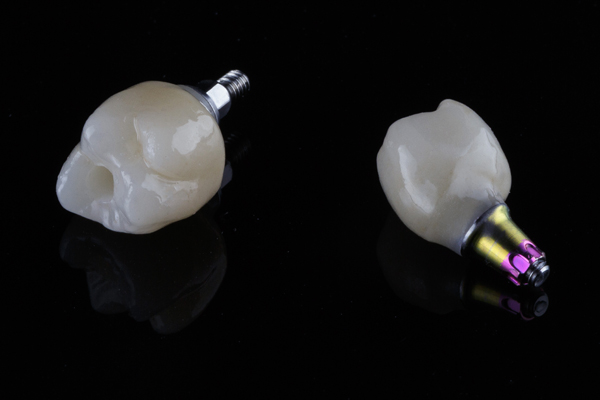Is It Possible To Whiten Dental Crowns?

Dentists use dental crowns to protect or restore damaged teeth. Sometimes, tooth decay becomes too advanced or cracking may weaken the structure of the teeth. In these cases, a dentist may suggest a crown when fillings cannot solve the issue. Crowns are caps made of various materials, including ceramic, resin, porcelain, and metal.
Crown placement is a routine procedure, but many people wonder if they can have their crowns whitened at a later date. The short answer is that crowns do not whiten in the same way that natural teeth do, so it is important to have them properly color matched before placement. Here is what you need to know about crowns and whitening.
The truth behind whitening and crowns
Over time, teeth change color. Coffee, red wine, and tea tend to be the worst culprits when it comes to staining. The color pigments stick to the outer part of the tooth and enamel. Additionally, age changes the colors of a patient's teeth. The teeth have a white outer shell and a yellow dentin beneath it. As the outer enamel becomes thinner, the teeth appear more yellow.
When dentists shape crowns, they choose a color based on the color of the patient's teeth. Generally, the patient's teeth may change colors around the crowns.
How teeth whitening works
Tooth whitening products contain hydrogen peroxide or carbamide peroxide. The bleach breaks the stains into smaller pieces to create a less concentrated color and to brighten the teeth. The chemicals penetrate the tooth's enamel to handle the stains. To change the color of the tooth, the bleach has to seep into the hard structure of the tooth.
To whiten teeth, patients can use stain removal toothpastes, in-office bleaching, or at-home bleaching kits. Toothpastes have mild abrasives to scrub the teeth, along with polishing agents to remove stains, but you will generally get more dramatic results at your dentist's office.
During an in-office whitening procedure, the dentist applies a rubber shield or protective gel to the gums before applying bleach to the teeth. Dentists use a heating lamp for three 20-minute intervals. At-home bleaching kits come with trays customized by the dental office for the patient's mouth. The patient receives instructions on how to apply the bleach. The process can take a few days or a few weeks.
Whitening agents cannot penetrate the crown's materials. In some cases, tooth-colored fillings can undergo whitening treatment with some success, but this is because the tooth around the filling changes color. With veneers, dentists may try to whiten the areas of exposed tooth.
How to whiten dental crowns
Color matching prior to the placement of a crown is important. If you are unhappy with the color of your teeth overall and will be needing a crown, you may want to have a whitening treatment done before getting the crown. Then, your dentist can match the color to your newly whitened teeth.
If patients want a whiter smile long after getting a crown, they can still undergo whitening treatment. Most patients do not have dental crowns covering all of their teeth. They can whiten the teeth around the crowns. Of course, the crown may still have stains and be a different color from the rest of the smile.
To whiten the crowns, patients have to consider replacing the crown. Dentists can whiten the teeth and then create a new crown based on the whiter smile.
Some patients have crowns for decades, and over time, the restoration becomes dingy or flat. Nowadays, crowns can be bright and white and remain that way longer. If the original color has faded, the dentist removes the crown and cleans the underlying tooth of any stains or decay. The dentist can place a new crown to match the patient's white smile.
Keep in mind, also, that regular professional cleanings can help remove surface stains from crowns as well as natural teeth. So even if whitening agents cannot penetrate the crown, a cleaning can remove stains from coffee, red wine, and other substances. The key is to get your mouth cleaned regularly at the dentist office.
Conclusion
When it comes to dental crowns, teeth whitening processes do not work because the bleaching agent cannot penetrate the exterior of the crown. While patients can whiten the teeth around the crowns, they should replace crowns after a whitening treatment if stains remain and show a significant color difference between natural teeth and crowns.
Request an appointment here: https://www.kingdentistry.com or call King Dentistry at (209) 585-1474 for an appointment in our Turlock office.
Check out what others are saying about our dental services on Yelp: Dental Crowns in Turlock, CA.
Recent Posts
Dental crowns and veneers can both restore the function and appearance of damaged teeth. That damage can take the form of decay, discoloration, chips or cracks, or a crooked appearance. The main difference is that a crown goes over the whole tooth, whereas a veneer only sits on the front. Beyond that, there are pros…
A dental crowns can treat many oral issues. Also known as dental caps, crowns cover up damaged teeth completely, instantly restoring their form and function. The cosmetic and restorative properties of caps make them so popular with dentists. A dental crown is a way to extend the life of a badly damaged tooth and avoid…
Are you considering getting dental crowns? Before moving forward, you need to ask your dentist some questions. This will help you understand the procedure and what to expect when it is over. Then you will have the information you need to make an informed decision about dental crowns.Getting crowns is a huge decision. Patients should…
While the cost of dental crowns is usually covered by insurance, getting a crown can still be an expensive and time-consuming process. Once the crown is in place, it can be tempting to forget about it and continue your normal habits, but not being mindful of your tooth restoration could lead to you having to…


